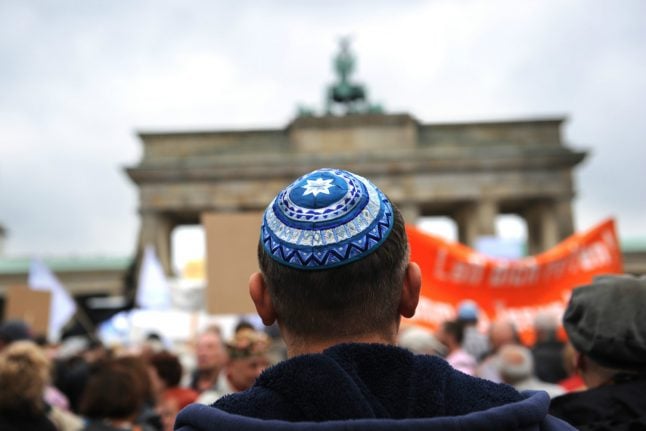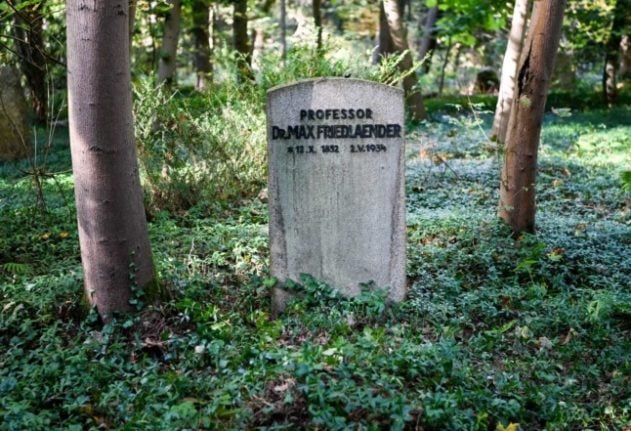A full 27 percent of all Germans and 18 percent of a population group categorized as “elite” – or university graduates with an annual income of at least €100,000 – have anti-Semitic thoughts, according to the survey.
Another 41 percent think that Jews talk too much about the Holocaust, the representative survey of the World Jewish Congress (WJC), reported in German daily Süddeutsche Zeitung, showed.
Yet every fourth interviewee considered it possible that “something like the Holocaust can repeat itself in Germany today”.
The WJC, the umbrella organization of Jewish communities and organizations from more than 100 countries, had interviewed 1,300 people around Germany two and a half months before the attack on the synagogue in Halle.
READ ALSO: What we know about the synagogue shooting in Halle
The overwhelming majority of the population furthermore sees growing anti-Semitism as a trend, and associates it with the success of right-wing extremist parties.
The connection is recognized by 65 percent of Germans and 76 percent of the “elite.”
Twenty-eight percent of them claim that Jews have too much power in the economy, while 26 percent think that they have “too much power in world politics” – statements that belong to the classic repertoire of anti-Semitism.
Almost half of them (48 percent) claim that Jews are more loyal to Israel than to Germany.
Growing willingness to take action
At the same time, according to the study, there is a growing willingness in Germany to take action against anti-Semitism.
Two thirds of the “elite” would sign a petition against it, and one third of all respondents would take to the streets against anti-Semitism.
About 60 percent felt that Jews are exposed to a risk of violence or hateful verbal attacks. Nevertheless, only 44 percent at the time were concerned about violence against Jews or Jewish institutions.
READ ALSO: 'Drastic increase' of violent anti-Semitic attacks in Berlin, according to figures
The President of the World Jewish Congress, Ronald S. Lauder, said that anti-Semitism had reached a crisis point in Germany.
“It is time for the whole of German society to take a stand and fight anti-Semitism head-on,” said Lauder.
“Germany has a unique obligation to prevent the return of intolerance and hatred. If more than a quarter of society identifies with anti-Semitism, it is time for the remaining three quarters to defend democracy and tolerant societies.”
Vocabulary
University graduates – (die) Hochschulabsolventen
Growing anti-Semitism – Wachsender Antisemitismus
statements/assertions – (die) Aussagen
A unique obligation – eine einmalige Verpflichtung
Defend – verteidigen
We're aiming to help our readers improve their German by translating vocabulary from some of our news stories. Did you find this article useful? Let us know.



 Please whitelist us to continue reading.
Please whitelist us to continue reading.
The survey that is the basis of this news item is a bit tenuous. One suspects that a similar proportion of French, British, Italian, Spanish and Eastern European’s harbour the same views as Germans. The difference is that Germans are more honest in answering survey questions. Furthermore, an increasing challenge is the ever widening definition of anti-semitism. For example, one can now be labelled anti-Semitic for criticising Israeli policies of appropriating Arab lands on the West Bank. The whole thing is a minefield.
My personal observations are that one is far more likely to attract the attention of the law for genuine anti-semitism in Germany than in most other European countries and that can only be a good thing.
A quick google tells me that about 20% of Americans polled as antisemitic. So it seems that is just the ambient level.
Every nation is anti-semitic. Everybody fears the cultures they don’t know. Considering Germany was rushed by a wave of migrants the last few years, it’s normal they feel fear and anguish. That’s why they might answer that they don’t want strangers in their country because they didn’t ask for them.